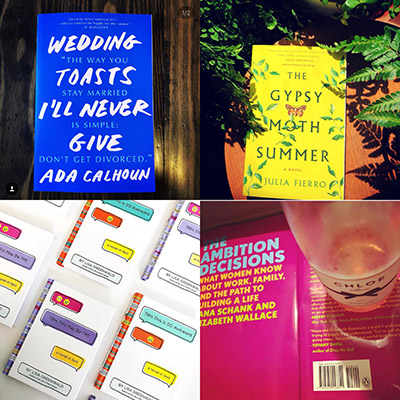It’s the middle of July, and today is a Tuesday when I normally put up an episode of MILK.
I don’t have an episode.
The episode I’m imagining was supposed to tie up this season of MILK Podcast: Moms I’d Like to Know, Lost and Found. I had planned to interview my kids and husband about the past 5 months we’ve spent together since New York City shut down on March 13, 2020.
It’s been on my to-do list for three weeks now.
During the pandemic, I’ve produced 15 episodes about being lost and being found. Episode 6 and beyond were remote interviews, as the pandemic unfolded and doing things from my home studio became the only way to keep my show going. Every woman (and one man!) I interviewed during this time has helped me to feel less scared and more connected during a truly fucking weird time. We’ve discussed motherhood and failure and pivoting and racism and sexual abuse and activism. We’ve discussed books they’ve written and thoughts they’ve had and fears they’ve navigated. What they have learned about themselves as they go through losses in real time – what is there left to find? I hope these conversations have resonated.
I can hear my son through the wall we share. He’s plays Roblox for hours these days. My daughter sleeps until 1 pm or later. Both have refused online classes during the summer. Camp wasn’t an option. Parenting as a verb is long gone. I think I’m doing my best? If I’m being honest, the only time I feel “successful” is when I’m cleaning out a drawer or after I exercise. It is not optimal.
NYC is in Phase 4 now with some exceptions. That means we are doing well. My husband and I make arbitrary decisions every day about what is safe, and what is comfortable. Our family left town for a few weeks when “school” was winding down to a wimper. We celebrated our daughter’s middle school graduation by watching a schmaltzy video with her in her cap and gown. We safely (we hope) socialized with our friends outdoors, trying to create normalcy and some fun for our kids. We noticed the unsettling feeling of being in a Trump-y community in upstate New York (boats with flags on the lake, unmasked people in the Target, very few cases of actual Coronovirus) and how complex that felt after the sirens, the sickness and the suffering happening just three hours downstate -- not to mention the protests and the curfews and the helicopters.
We returned to Brooklyn last week, and ate dinner outside on the sidewalk of our neighborhood local spot. Seeing people on the street again doing all of their New York City things, only in masks, feels to me like a weirdo Richard Scary BusyTown book about our city coming back to life (pig construction worker poking his head out of the manhole, fox waitress carrying food, fox and pig couple biking along with masks after getting a haircut). These are all pleasant things that feel like we’ve made progress as a city, and that our efforts to socially distance have had an effect. But March, April, May and June will live inside my head forever. The terror and anxiety. The anger. The pride in our essential workers. The rawness of inequality in every system we are supposed to rely on. And the knowledge that those with money are always always always less vulnerable.
It’s summer and I’m not used to hiding out in my house. I want to send my kids to camp, I want to sit inside a café in the AC, and go to the beach without a mask. And yet, worrying or desiring these aspects of a normal summer is so obviously a luxury.
I hear people around me figuring out what is best for them and their families, debating “coming back” to New York, and it reminds me of all of the other scrambling we’ve had to do at so many junctures of family life before this one, with so little support for working families across the socioeconomic spectrum. Figuring out childcare after I had my first kid, my second, and what was the calculus on housing in NYC balanced with sending my kids to public school, which I believe in regardless of its flaws. I’m reminded of that as I hear people talking about homeschooling and podding and hiring tutors so they can work from home. School will happen in some form in a month or so, and this is a limbo moment where I am expecting very little from an education system so weighed down, so inequitable. I know that I will bear the brunt of making sure my kids are getting what they need. I also know my kids will ultimately be fine. But what about ALL kids?
I feel very connected to my neighborhood and to my city and to the people who are working hard to boost and bring things back to life. I feel like it is my job to help with that, not to dismiss New York as some kind of court jester designed to entertain me.
I want to be a part of systemic change. I also want to be around for my kids right now, but I have no idea if I’m doing any of this right.
Hopefully I’ll have that podcast episode tying it all together neatly with some answers soon. Stay tuned.





